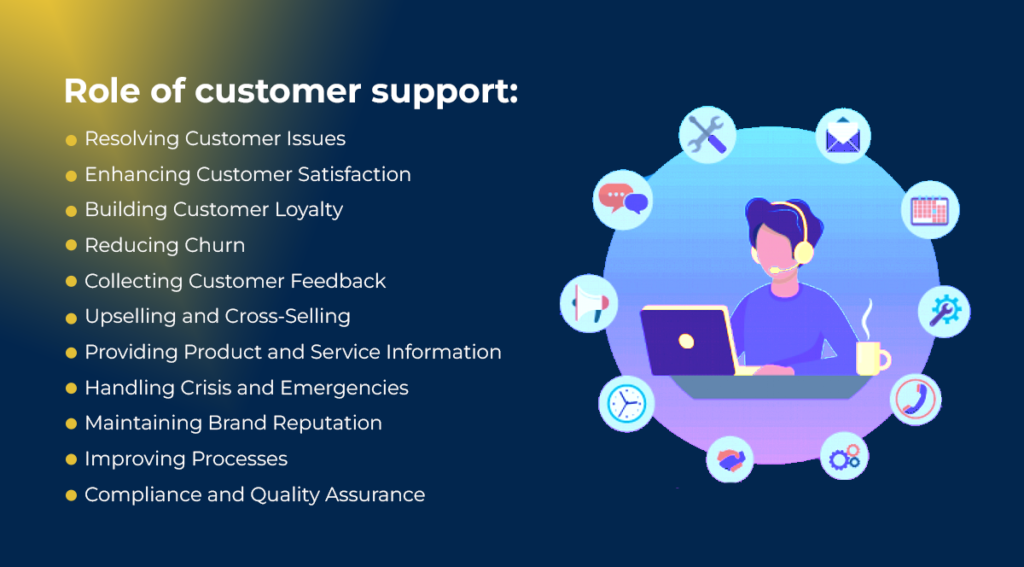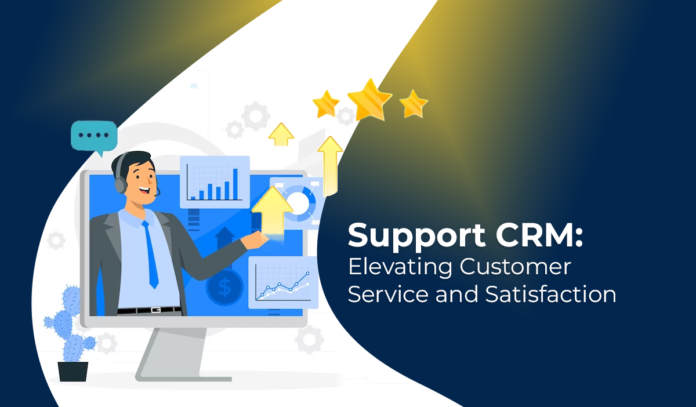There is one word that stands tall as a beacon of customer satisfaction: Support CRM.
Imagine a world where every customer interaction feels like a personalized journey, where issues are resolved at the speed of thought, and where loyalty knows no bounds.
Welcome to the realm of Support CRM, where the art of customer support is transformed into a science of delight.
After all, Customer Relationship Management (CRM) is about more than just sales and marketing. It’s a powerhouse that can revolutionize customer support and satisfaction.
Why is Customer Support so Important?

The role of customer support in businesses is multifaceted and critical for long-term success. The primary role is to address customer inquiries and concerns. Prompt and effective issue resolution contributes to customer satisfaction, reduced churn, and increased retention.
Customer support teams often serve as a valuable source of feedback from customers. They can gather insights into customer preferences, pain points, and suggestions for improvement, which can inform product development and marketing strategies.
The way a business handles customer inquiries and complaints directly affects its reputation. Positive interactions with customer support can lead to positive reviews and word-of-mouth recommendations.
Given the key role the customer support team plays in the branding and revenue generation of a business, many are investing in a good support CRM.
What is Support CRM?
CRM software comes with a comprehensive strategy and set of technologies businesses use to manage and analyze their interactions with current and potential customers.
A CRM systematically collects, organizes, and utilizes customer data to enhance customer relationships, streamline sales and marketing processes, and ultimately drive business growth.
Support CRM, often called Customer Support CRM, is a specialized subset designed to streamline and optimize customer support and service operations.
It focuses on managing interactions and relationships with existing customers by providing tools and features that enable businesses to deliver timely and effective support solutions.
What are the Key Features of a Support CRM?
A support CRM plays a vital role in maintaining customer loyalty and trust. Let’s have a look at some of the main aspects a robust CRM designed for customer support should provide.
- Ticket Management
Support CRM systems typically include a ticketing system that allows customer support teams to efficiently log, track, and manage customer inquiries, issues, or service requests. Each inquiry is treated as a “ticket” that can be assigned to specific agents, prioritized, and tracked until resolution.
- Automation
Support CRM systems automate repetitive tasks such as routing tickets, assigning them to the right agents, and sending automated responses to common inquiries. This automation increases efficiency and ensures no customer request is overlooked.
- Customer History and Data
These systems maintain detailed customer profiles and interaction histories, enabling support agents to access relevant information quickly. This allows for personalized and context-aware interactions.
- Multichannel Support
A CRM designed for support teams can manage customer inquiries from various communication channels, including email, phone, chat, social media, and more. It ensures a consistent and unified support experience across all channels.
- Integration
Many Support CRM systems integrate with other business tools and CRM modules, such as sales and marketing, ensuring a seamless flow of customer information and providing a holistic view of the customer journey.
- Customer Feedback and Surveys
They often include features for collecting customer feedback and conducting satisfaction surveys. This helps businesses gauge customer sentiment and make necessary improvements.
- Escalation and SLA Management
Support CRM systems allow businesses to define and manage service level agreements (SLAs) and escalation processes to ensure the timely resolution of critical issues.
How will a Support CRM elevate your Customer Service and Satisfaction?
A support CRM system goes beyond just managing support tasks; it transforms customer interactions into opportunities to enhance satisfaction.
By focusing on a holistic view, proactive communication, data-driven improvements, and personalized service, businesses can create support experiences that leave customers truly satisfied in the following ways.
- 360° Customer View
Support CRM systems consolidate customer data from various touchpoints and interactions. This comprehensive view enables support agents to understand the customer’s history and needs thoroughly.
By having a holistic understanding of the customer, support agents can anticipate their needs and provide tailored solutions, leading to higher satisfaction.
- Enhanced Communication
Support CRM tools often include omni-communication features such as automated responses, email templates, and chatbots. These tools ensure timely and clear communication.
Prompt and effective communication reassures customers that their concerns are being heard and addressed, improving their satisfaction.
- Predictive Analytics
Support CRM systems leverage predictive analytics to anticipate customer issues or needs. For example, they can identify when a customer may require a product upgrade or additional support.
Proactively reaching out to customers with relevant solutions or personalized offers can delight them and enhance satisfaction.
- Effortless Issue Resolution
CRM systems streamline the resolution process by ensuring that all necessary information is readily available to support agents.
When customers experience smooth and efficient issue resolution, they are more likely to rate their support interactions positively.
- Empowered Support Agents
Support CRM equips support agents with the tools and insights they need to excel in their roles. This empowerment translates into more confident and capable support interactions.
When customers perceive support agents as knowledgeable and capable, it enhances their satisfaction with the support experience.
Conclusion
In a business world where customer satisfaction is the ultimate measure of success, Support CRM emerges as the unsung hero, quietly orchestrating experiences that leave lasting impressions.
Support CRM transforms support interactions into opportunities to exceed expectations, anticipate needs, and foster loyalty. It’s the engine that drives businesses toward a future where customer delight isn’t just a goal, it’s a way of life.
So, as you navigate the ever-changing seas of customer relationships, remember the power of Support CRM. It’s not just a system, it’s a philosophy – a philosophy that champions the customer, values their time, and strives for perfection.
Make an informed decision when it comes to choosing a Support CRM















